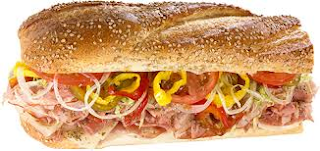I guess I have to be a little thankful for David Brooks because he gives me a reason to not blog (again!) about Trump/Russia, and to blog about things I really have always cared about--socioeconomics and food. Basically, he wrote a column where there was so much other stuff, but the thing everyone honed in on was the friend he was going to have lunch with in a gourmet sandwich shop, who seemed put off and so they agreed to have Mexican, instead. He seems to have taken for granted (and maybe I'm compounding the error by 'assuming his assumption") that she was put off by all the exotic Italian words on the menu because she only had a HS diploma.
All us East Coast elites like my working class BA in English ass wondered WTF. You don't need a degree to know what you want on a sandwich or to have familiarity with an array of Italian meats and cheeses. I come from the vibrant sandwich culture of Philadelphia, where sandwich literacy begins in grade school and full sandwich literacy is assumed by completion of high school. It isn't a function of class, either. The brokest person you ever saw knows whether they want spicy ham and provolone on their sandwich, or if they're hanging with the American hoagie. They know if they want hot peppers or hold the onions. If you come up in the right neighborhood, you are beyond the what goes into a sandwich and have moved on to the sublime characteristics of what's good bread (Does the quality of the bread depend on the water? Is it the heat of the furnace?) and whether the meats and cheeses are actually authentically sourced (Quiznos--is this Italian salami? No--I ask you!) by adulthood.
It isn't even a parochial thing. Jewish deli, Italian cheesesteaks, Vietnamese banh mi (but really, order the pho--of which there are more varieties, all great, than you can shake a stick at), if you are from a pretty diverse local culture, you don't balk at Italian on the menu. If I wandered into a Nigerian restaurant (a cuisine I'm not so well acquainted with) I'd ask a server--what do you recommend? What is spicy and what isn't? What is in this? That's not education, and that's not class--I just know you have to assume food is edible and trust that no one likes food that sucks.
But the forces that made me omnivorous across the cultural landscape didn't make my parents. They don't do sushi. They order mostly the same five or six things from the Chinese take-out. I don't think they can hit up an Indian buffet and deal with the abundance of distinctly different palate-choices than they grew up with. But trust this--they can figure out an Italian sandwich. They are not Italian--they just got this. They did not need Intro to Salumi 101.They just aren't going to waste a buck or twelve on food they find out they don't want to eat--
Which brings me back to Brooks' friend. Maybe she digested that what was on offer was $20 sandwiches that she could get for $8 anywhere else. Maybe she didn't want aioli breath. Maybe she just knew Mexican almost always offers better value for price since it hasn't been gentrified by third generation pezzonovantes. The thing is--a lot of us middle class/working class people who get to traipse into the upper strata aren't unprepared for the secret handshake--we just balk at the prices.
I probably could have been a little brighter and applied to schools I knew we couldn't afford--but I chose one I knew we could swing. Was I able to apply for scholarships, etc? (Maybe.) Was I afraid I'd fail? (Always.) Did that choice make me less competitive as an employable adult? See--I get that the first several of Brooks' paragraphs talk about what I've tried to talk about in my "Know Your Class War" pieces. He's maybe not specifically laying the blame at white privilege and the whole tilted table at specific class prejudices--but he is bringing some of it up--and I think that's kind of positive, really. But it isn't culturally about the barriers, the sort of intellectual poll tax he's assuming people are not able to pay to enter the upwardly mobile franchise.
People have knowledge and great opinions and different opinions and a variety of experiences and a host of likes and dislikes--but the entrée to the actual society he's talking about, after all, is still money. To see that Broadway show, to have that leisure time to catch up on news/entertainment/reading, to go eat the world? Takes money. It's always about money. To live in that school district and get the ear of that congresscritter. It isn't the capicollo. It's the Benjamins.
But maybe this also adds color to the times we see some people (even of means) treat Olive Garden like a real taste of Italy, even if they are in a major city where more authentic fare can be had--they want to know what they are getting, and they trust the chains because they did not have an environment that gave them the "eatportunities" a richer cultural environment might have. People make checkbook decisions. They don't feel like they can afford to have an unpredictable bad time.
You have to take it all into account--and still recognize that taste is individual, and often based in experiences. Maybe a sandwich is just a sandwich--maybe one column can't really take in the scope of choice versus economic availability. I'm not here to bury or praise Brooks, just to point out that while his example is broken, his broader topic (while he does not have the range to really explore it) is a good jumping-off point for further and better discussion.


No comments:
Post a Comment